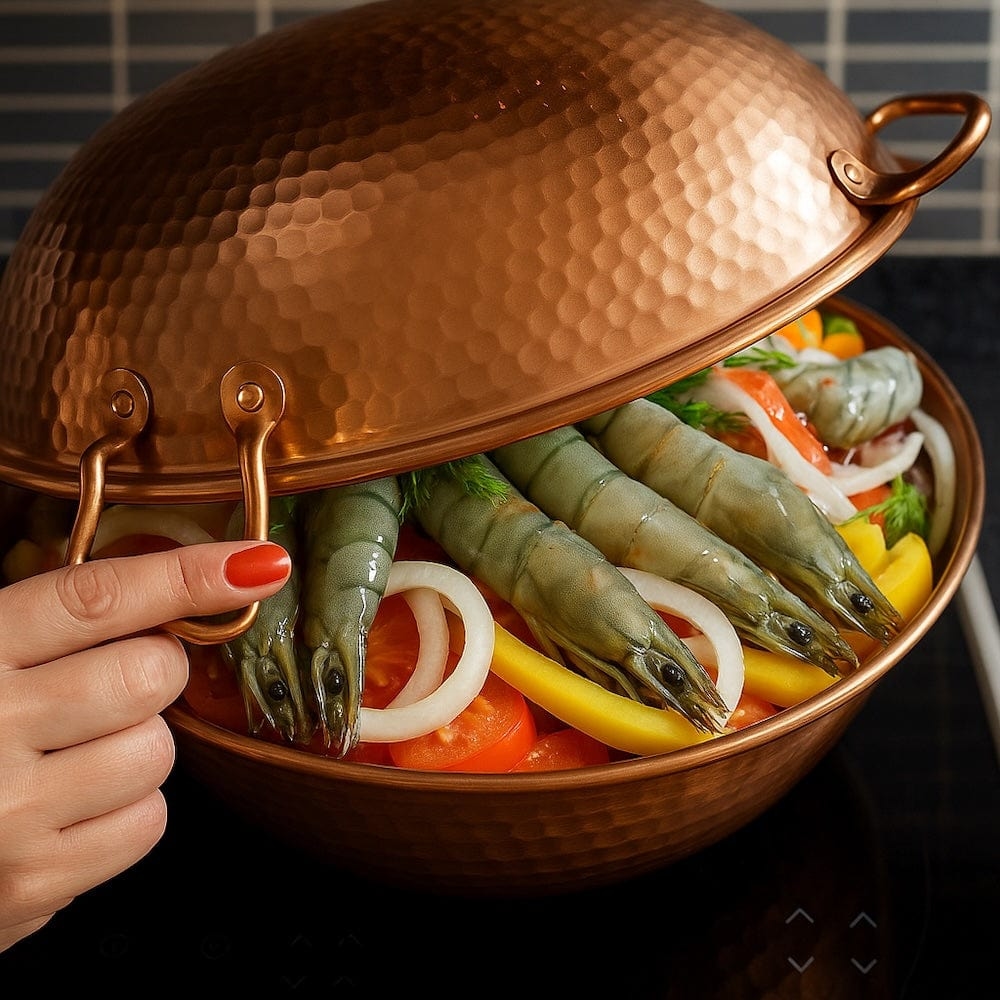
I don’t know about you, but for me, just hearing the word cataplana already brings to mind the sound of the lid lifting, the steam escaping, and that blend of garlic, white wine and sea air filling the kitchen. A Portuguese dish full of sunshine, humour and conviviality, but also (let’s admit it) a little technical challenge when you want to reproduce it at home ! (unless, of course, you’ve had a bit of practice !)
So today, let’s put on our apron, clear some space on the counter, and set off to conquer this treasure of Portuguese cuisine. You don’t need to be a Michelin-starred chef, promise, just a little patience, good ingredients and the desire to imagine yourself, for one dinner, on the coast of the Algarve (if I managed, I’m sure you can too !)
But first, what exactly is a cataplana ?
If you’ve never heard the word before, imagine a casserole that decided to be elegant. The cataplana is both the name of the dish and the utensil it’s cooked in. Two rounded shells, usually copper or stainless steel, joined by a hinge and sealed tight. The result : gentle, aromatic steam-cooking, and above all… zero loss of flavour, an absolute treat !
This wonder hails from the south of Portugal, more precisely from the Algarve, where Arab influences have left their mark even in the pots and pans. It’s a bit like the local tagine, but in a seafood and Mediterranean version (if we can put it that way).
Traditionally, it’s used to make fish and seafood cataplanas, bursting with colour and flavour. But beware : there’s no single recipe here ! Every village, every family has its own version. And if you ask ten Portuguese people for “the best recipe”, you’ll get ten different answers (and ten passionate debates, you’ve been warned).
The magic of the dish : simple, yet spectacular
That’s what I love about the cataplana, it looks impressive… but it’s really not complicated.
When you serve it, lid still closed, your guests look at you with curiosity. Then you lift it slowly, the steam rises, everyone goes quiet, and bam, the aroma does the rest. At that moment, you’ve already won the evening. And it’s got that wonderfully social side too : the cataplana sits proudly in the middle of the table, everyone helps themselves, wipes up the sauce with crispy bread (obviously), goes back for seconds, and nobody cares what time it is.
The essential ingredients (and a few bonus tips)
For a fish cataplana for 4 people, you’ll need :
- 600 g of white fish (such as cod, monkfish or sea bream, your choice)
- 300 g of prawns or king prawns
- 300 g of clams or mussels
- 1 onion
- 2 cloves of garlic
- 1 red pepper
- 2 ripe tomatoes
- 100 ml of dry white wine (and no, not the leftover cooking wine, a real one you’d happily drink)
- 4 tablespoons of olive oil
- 1 teaspoon of sweet paprika
- 1 bay leaf
- A few sprigs of fresh coriander (or parsley if coriander isn’t your thing, no judgement)
- Salt, pepper, and a zest of love (yes, that’s important too)
Tip n°1 : if you don’t have a cataplana, don’t panic ! A cast-iron casserole or a large pot with a lid will do just fine… The key is gentle, sealed cooking that keeps the steam and flavours inside.
…and Tip n°2 : in Portugal, some people add a few slices of chouriço to their cataplana for a smoky touch. If that tempts you, go for it, it adds depth without overpowering the fish.
Step 1 : the aromatic base (the secret to the flavour)
This is where the magic begins. Heat the olive oil at the bottom of your cataplana (or casserole), then add the chopped onion, garlic and sliced red pepper. Let them sweat gently, without browning.
When the smell becomes irresistible (which happens quickly), add the peeled and chopped tomatoes, paprika, bay leaf, a pinch of salt and pepper. Let it simmer for a few minutes until it becomes a rich, orange-red sauce, shiny and fragrant, smelling like summer and sea breeze.
Step 2 : the fish takes the stage
Lay your fish pieces in this base. Pour the white wine over the top, cover, and let it cook gently for about fifteen minutes.
The goal is to let the fish cook slowly in its steam, without falling apart. And in the meantime, your kitchen will start smelling like holidays. (If you close your eyes, you can almost hear the seagulls, and no, I’m not talking about your kids, but about Portugal, just in case you were wondering.)
Step 3 : the seafood, for the finishing touch
Now add the prawns and clams. Close the lid again, and let it simmer for another 10 minutes. The shells will open, their juices will blend into the sauce… and that’s the grand finale !
Tip n°3 : whatever you do, don’t stir too much at this stage. Let the cataplana do the work for you, it’s a dish that loves patience and trust.
Step 4 : the tasting (and the applause)
Lift the lid, let the steam escape… and enjoy that brief, admiring silence from your guests.
Sprinkle with fresh coriander, serve directly in the cataplana, alongside Portuguese bread or white rice to soak up the juices. And most importantly : don’t bother counting portions, we all know nobody stops after just one plate !

A taste of the Algarve in your kitchen
The magic of the cataplana is that it’s a dish from the heart, not from precision. You can adapt it however you like : change the fish, add vegetables, throw in a dash of piri-piri for the spice lovers… It’s southern cooking, free, generous, and led by instinct as much as by recipe. And that’s what makes it so charming.
Personally, I love preparing it on a Sunday lunchtime, when I’ve got some time, a Portuguese playlist playing softly, and the feeling that the air suddenly smells like the Atlantic. (Yes, it’s psychological. But it works ! and beautifully.)
A few mistakes to avoid (speaking from experience…)
Too much liquid : a cataplana is a steam dish, not a soup. The wine and the juices from the vegetables are more than enough.
Forgetting to taste before serving : seasoning is everything. A quick spoonful before you serve, and adjust if needed.
Opening it without ceremony : no, no, no ! The moment of unveiling is the showstopper. Do it slowly, let the steam rise, and enjoy the reactions around the table.
A recipe, but above all a state of mind
In the end, mastering a fish cataplana at home isn’t just about getting a dish right. It’s about recreating a little of what the Portuguese do best : turning simplicity into happiness.
It’s an invitation to slow down, to savour, to share. To cook without stress, to laugh while stirring the sauce, to raise a glass while it simmers. Because here, perfection isn’t the goal, pleasure is.
And if, when you taste it, you feel a little warmth, a little sea, a little joy… then you’ve done it. Your cataplana is a success. And now ? All that’s left is to invite a few friends, open a good bottle of vinho verde, and let the magic happen. Oh, and maybe warn the neighbours : the smell might make them hungry !
Bom apetite !
Share this article
Suggested articles

Pão de Ló
In every Portuguese family, there’s a cake that comes out of the oven like a little sun: the pão de ló. Golden, airy, soft, it always announces something joyful. It’s the cake of dressed-up Sundays, overfilled tables, and aunts who hug you too tightly while saying how much you’ve grown.
.jpg&w=3840&q=75)
Pastéis de Bacalhau
There are dishes that smell like holidays and grandma’s kitchen. Pastéis de bacalhau are exactly that. These little golden cod croquettes, crispy on the outside and soft on the inside, are at once an appetiser, a madeleine of Proust, and proof that Portugal has completely mastered the art of frying.
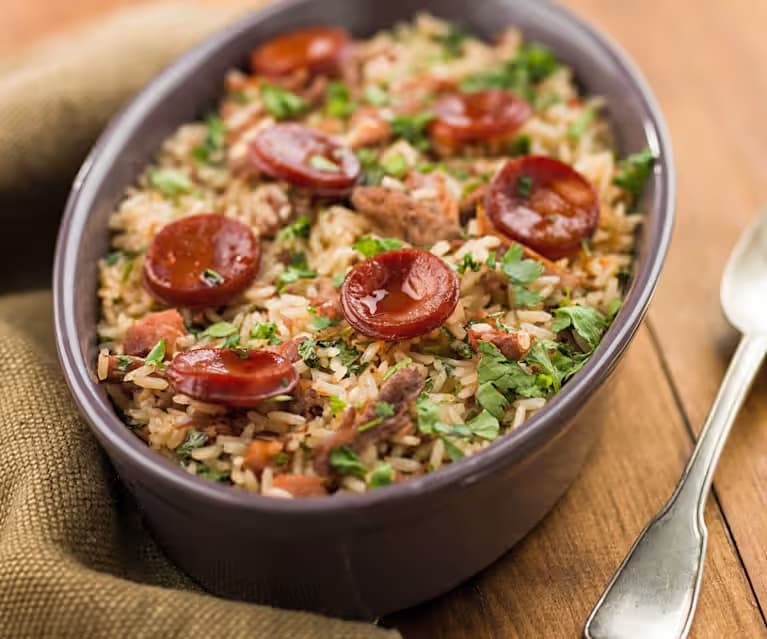
The secret of arroz de pato (duck rice)
Ah, arroz de pato… Just thinking about it makes me hungry ! This dish is the very definition of Portuguese comfort food, the kind that fills the house with rich aromas, warms the heart, and makes you forget bad weather (and sometimes even family arguments, yes really !).
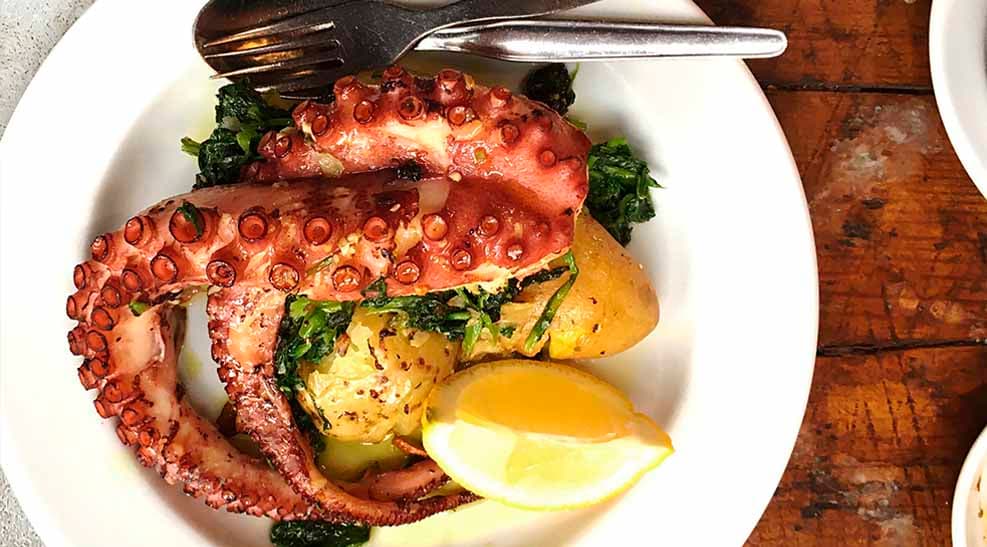
Polvo à Lagareiro : the roasted octopus in olive oil that melts Portugal (and you too)
If there’s one dish that perfectly sums up the generosity and simplicity of Portuguese cuisine, it’s Polvo à Lagareiro ! This roasted octopus drenched in olive oil, served with crispy potatoes and perfumed with garlic, is like a bit of Portuguese sunshine on a plate. It’s that dish everyone loves : the one you order “just to taste”… and then refuse to share.
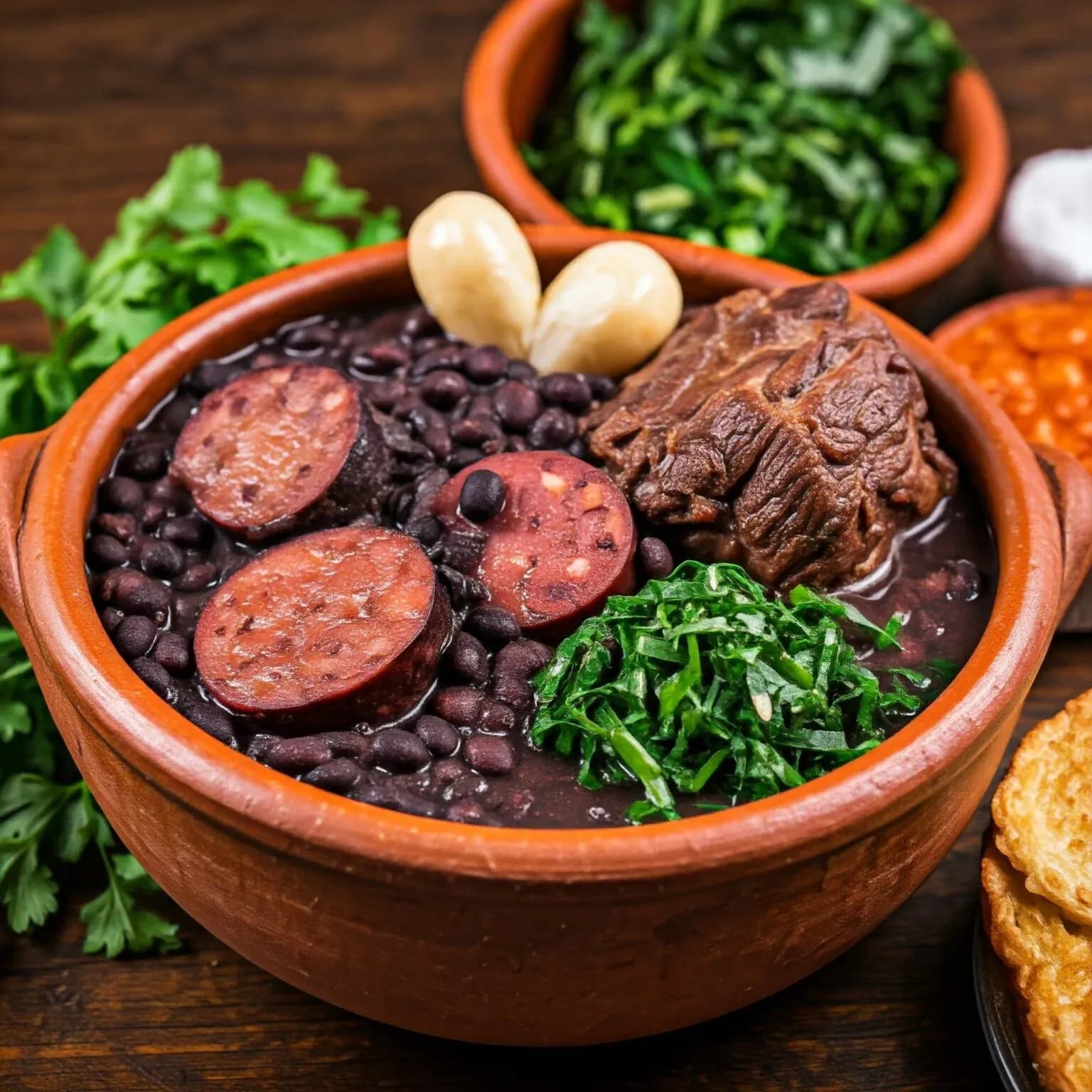
Feijoada à Portuguesa : THE ultimate Sunday family dish
If you’re looking for a meal that brings everyone together from the kids dragging their feet to the table to the grandparents checking their watches, look no further : Feijoada à Portuguesa is the secret weapon ! This hearty stew of beans cooked with a mix of meats, smoked sausages, and a touch of greens is the very definition of generous Portuguese cooking, “put everything on the table and help yourself.”
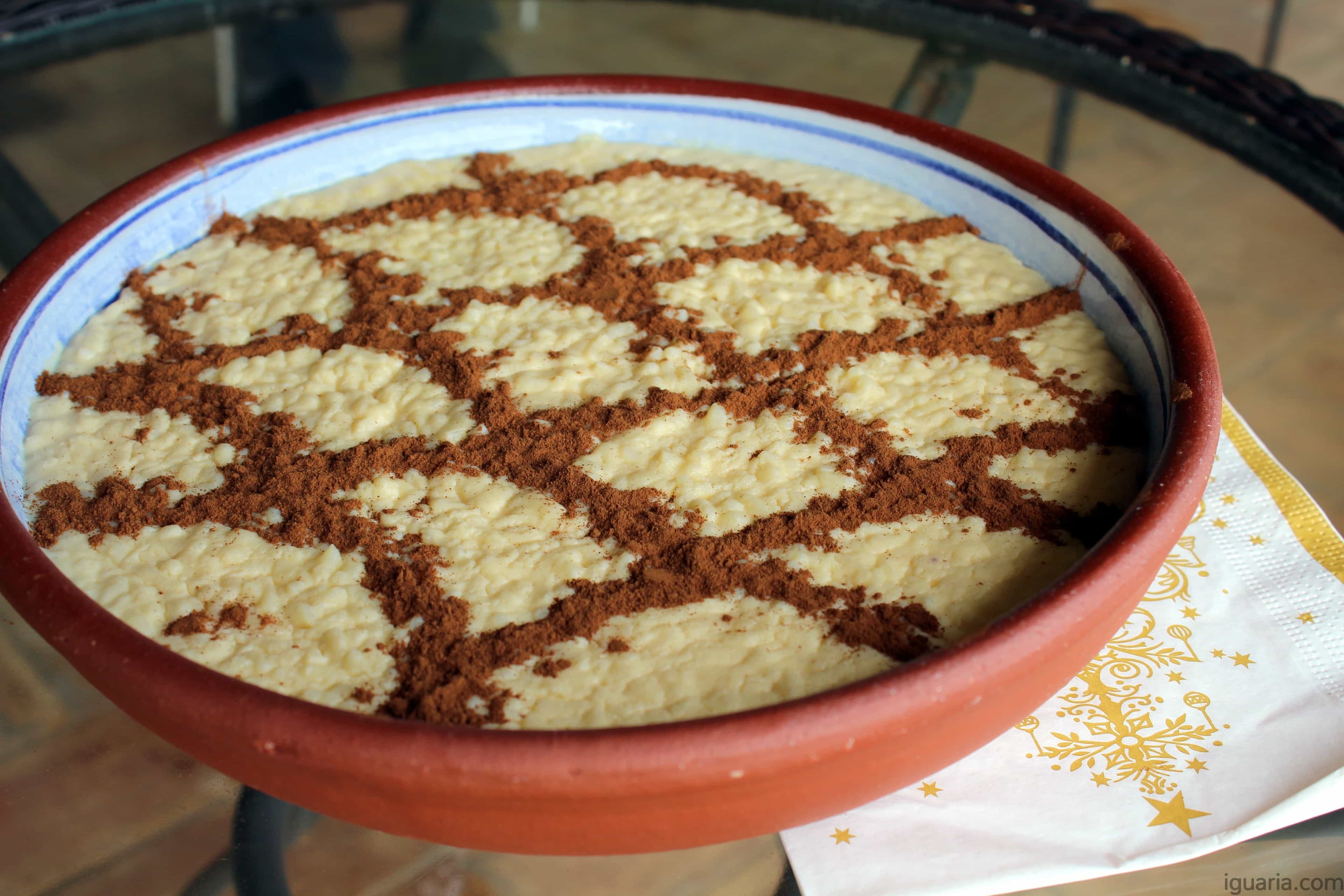
Arroz Doce : the cinnamon-kissed rice pudding that warms Portugal
This dessert may look simple and it is… but it’s exactly that simplicity that makes it so special. Arroz Doce, literally “sweet rice,” is a true institution of Portuguese cuisine : rice gently cooked in milk, infused with lemon zest and cinnamon, served during big celebrations or on a quiet winter Sunday when you just need a bit of comfort.


